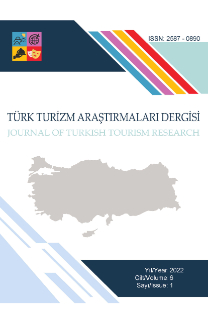Avrupa’da Termal Spa Terapi Uzmanı Mesleğinin Yeterlilik Alanlarına ve Eğitim İhtiyacına İlişkin Bir Araştırma
Research into the Competency Areas and Training Needs for the Occupation of Thermal Spa Therapist in Europe
___
- A study of competence profile for thermal spa therapist in project partner countries (2017). Avrupa Komisyonu Erasmus+ Projesi (Proje No: 2016-1-TR01-KA202-034712). http://thermal4all.eu/Uploads/Outputs/AStudyofCompetenceProfileforThermalSpaTherapist5E N.pdf’den indirildi.
- Bateman, A. and Coles, M. (2013). Qualifications frameworks and quality assurance of education and training. Bateman & Giles Pty Ltd.
- Beblavy, M., Akgüc, M., Fabo, B. and Lenaerts, K. (2016). CEPS special report: Occupations Observatory-Methodological note. Brussels: Centre for European Policy Studies.
- College of Massage Therapists Ontario (2005). Massage therapy competency standards. Canada: College of Massage Therapists Ontario.
- Costa, C., Quintela, J. and Mendes, J. (2015). Health and wellness tourism: A strategic plan for tourism and thermalism valorisation of São Pedro do Sul. In: Peris-Ortiz, M.; Álvarez-Garcia, J. (Eds.). Health and Wellness Tourism – Emergence of a New Market Segment, pp. 21-32. New York: Springer.
- European Commission. (2010). Communication 'Europe, the world's No 1 tourist destination – a new political framework for tourism in Europe'. 15.10.2017 tarihinde http://eurlex.europa.eu/LexUriServ/LexUriServ.do?uri=COM:2010:0352:FIN:EN:PDF adresinden alındı.
- European Parliament (2015). Tourism and European Union: Recent trends and policy developments. 15.10.2017 tarihinde http://www.europarl.europa.eu/RegData/etudes/IDAN/2015/568343/EPRS_IDA (2015)568343_EN.pdf adresinden alındı.
- European Union (2011). Using learning outcomes. Belgium: European Union.
- Georgescua, L. and Necsoi, I. (2013). Promoting e-learning educational programs for wellness and SPA therapies, 5th International Conference EDU-WORLD 2012 - Education Facing Contemporary World Issues, Procedia - Social and Behavioral Sciences 76, pp. 361 – 365.
- Global Spa Summit (GSS). (2011). Wellness tourism and medical tourism: Where do spas fit? New York: Global Spa Summit.
- Global Wellness Institute (2017). Global wellness economy monitor. Global Wellness Institute.
- Massage Therapist Association of Alberta (2011). Standards of practice for massage therapists. Canada: Massage Therapist Association of Alberta.
- Mernagh, E. (2006). Description of competences in EQF, 24.08.2018 tarihinde http://www.vocationalqualification.net/mmedia/2008.04.24/1209032216.pdf adresinden indirildi.
- MTBOK Task Force (2010). Massage therapy body of knowledge (MTBOK). 10.09.2018 tarihinde http://www.mtbok.org/resources.html. adresinden indirildi.
- Resmi Gazete, Tarihi: 24.07.2001 Sayısı: 24472. Kaplıcalar Yönetmeliği.
- Ritter, S. (2005). Trends and skills needed in the tourism sector: 'tourism for wellness'. In S.-I. Olga, & M. Tessaring, Trends and skill needs in tourism (pp. 79-88). Thessaloniki: European Centre for the Development of Vocational Training.
- Rivero, M. S., Rangel, C. R. and Caldito, L. A. (2016). Analysis of spa tourist motivations: A segmentation approach based on discriminant analysis. Enlightening Tourism: A Path making Journal, 6(1), 19-43.
- Rocha, A. S. S. and Brandao, A. (2014). On developing wellness and medical tourism: the characterization of a national thermal network. International Journal of Healthcare Management, 7(4), 226-236.
- Sefton, J. M., Shea, M. and Hines, C. (2011). Developing, maintaining and using a body of knowledge for the message therapy profession. International Journal of Therapeutic Massage and Bodywork, 39, 1-12.
- Smith, M. and Puczko, L. (2015). More than a special interest: defining and determining the demand for health tourism. Tourism Recreation Research, 40(2), 205-219.
- SRI International. (2010). Spas and the global wellness market: Synergies and opportunities. Global Spa Summit.
- ISSN: 2587-0890
- Yayın Aralığı: Yılda 4 Sayı
- Başlangıç: 2017
- Yayıncı: Prof. Dr. Yüksel ÖZTÜRK
Restoran Müşterilerinin Personel İletişim Düzeyi Algıları ve Memnuniyetleri Arasındaki İlişki
OZAN BÜYÜKYILMAZ, ÖMER CEYHUN APAK
Türk Devletlerinin Turizm Rekabetçilik Performansının Homojenlik Analizi
Orkhan ALİLİ, İsmail KIZILIRMAK
Elif Esma KARAMAN, NESLİHAN ÇETİNKAYA
SERCAN YILDIZ, LEVENT SELMAN GÖKTAŞ, Tuncay HABİL, F. Füsun İSTANBULLU DİNÇER
Türk Dünyası’nın Tanıtımında “Modern İpek Yolu Ortak Tur Paketi”
Turizm Endüstrisinde Blogların Gücü ve Turist Rehberleri Açısından Bir Değerlendirme
Mithat Zeki DİNÇER, TOLGA FAHRİ ÇAKMAK, MERVE AYDOĞAN ÇİFÇİ
Konfor Gıda Tüketimi: Mersin’den Örnekler
Serpil YALIM KAYA, Neslihan ŞİMŞEK, Celil ÇAKICI
SALİH KUŞLUVAN, Olcay YÜCEL, Karel Van ISACKER, António Silva DIAS, Petia GRUDEVA, Filip NICASI, Zdenka WLTAVSKY
